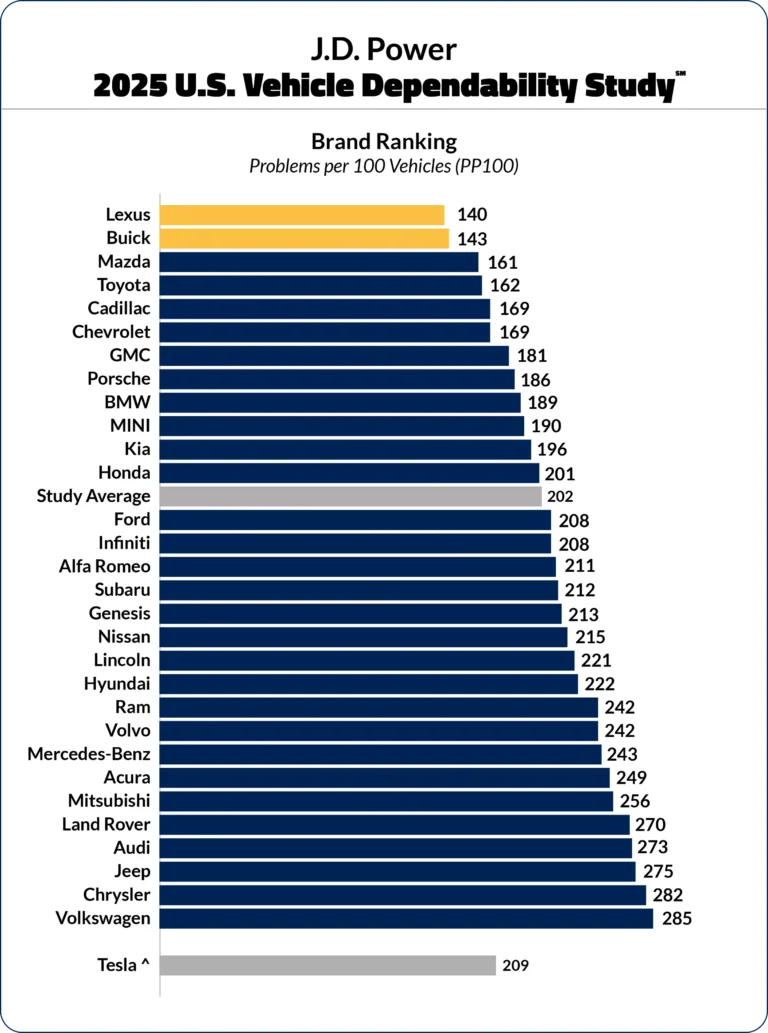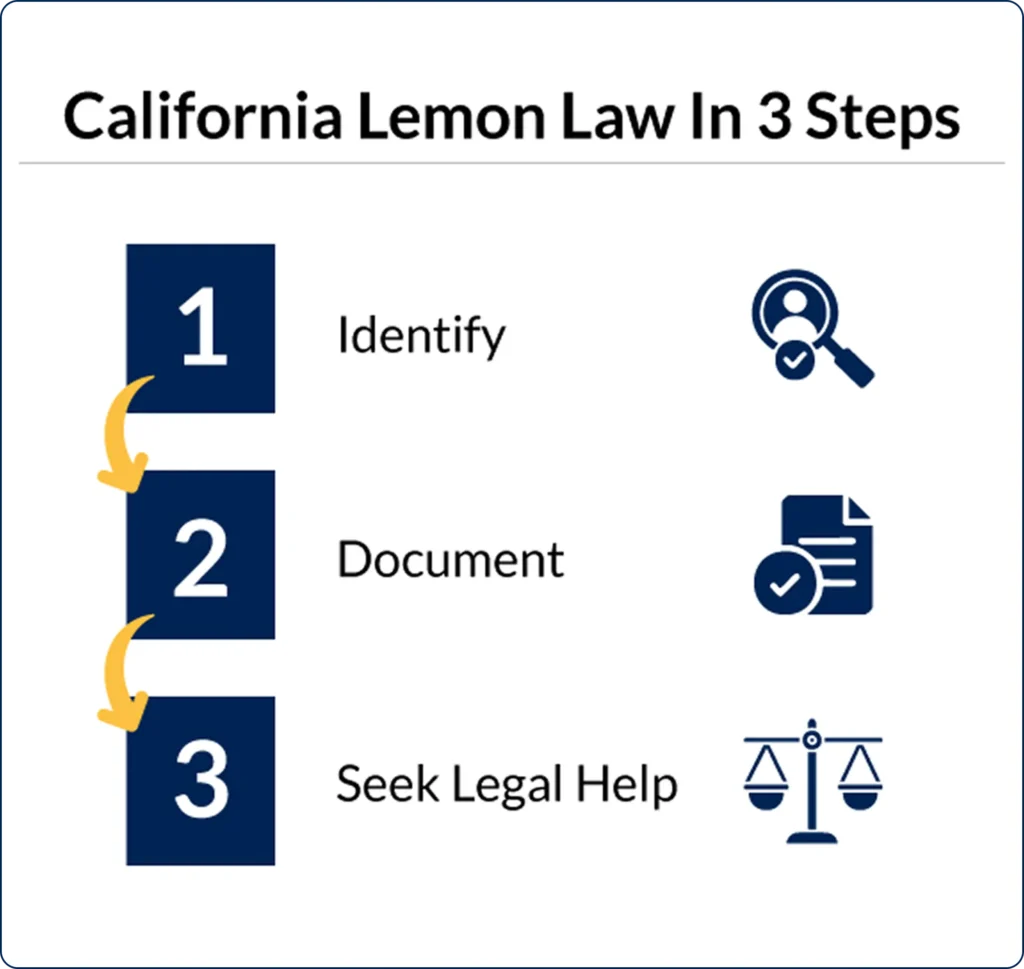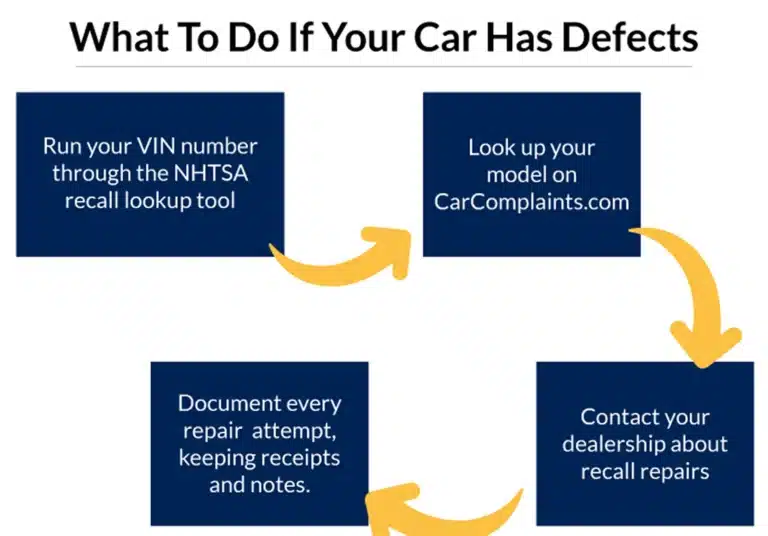The Worst Offenders: Car Brands With The Most Defects In The U.S.
A car is one of the most significant purchases most people will ever make. Drivers sign paperwork, hand over hard-earned savings, and expect a vehicle that feels safe and dependable. Unfortunately, reality often doesn’t match the promise. Every year in the United States, millions of cars leave the lot with hidden problems that turn daily commutes into repair shop visits, long road trips into breakdown scenes, and big dreams into financial stress.
Engine stalls, transmission failures, electrical glitches, and sudden recalls are more than just annoyances. These problems can cost thousands of dollars to repair and leave families stranded in unsafe situations. What’s more, defects appear across nearly every brand, from budget-friendly sedans to luxury electric vehicles.
This guide examines the car brands most frequently linked to defects, highlights models with long-standing reliability issues, and explains why these problems run deeper than a single repair bill. It also outlines how state and federal lemon laws protect consumers and what steps drivers can take if their vehicle turns out to be one of the unlucky ones.
At Lemon Law Help, our team assists drivers who are struggling with recurring car problems and warranty disputes. We help Californians understand their rights, navigate the legal process, and pursue the compensation they deserve when manufacturers fail to deliver a reliable vehicle.

The Car Brands With The Most Defects
Complaints and recalls tell a clear story. Year after year, certain automakers appear again and again in the National Highway Traffic Safety Administration’s complaint database and in dependability studies. According to the 2025 J.D. Power U.S. Vehicle Dependability Study, the average number of reported problems per 100 vehicles has increased industry-wide; however, a handful of brands stand out for their high volumes of serious issues.
Ford
Ford remains one of the largest U.S. manufacturers, with millions of vehicles on the road. But size hasn’t shielded it from defect complaints. Transmission failures in the Ford Focus and Fiesta plagued the company for years, leading to class-action lawsuits. Truck owners have reported steering problems, while recalls tied to faulty fuel systems and airbags have affected models like the F-150. Owners have described repeated trips to the dealer with little progress.
General Motors (Chevrolet, GMC, Cadillac, Buick)
GM has faced its share of scandals. To this day, electrical defects, engine stalling, and steering problems persist as ongoing issues. With new lines of electric vehicles in the mix, software defects that affect infotainment systems can leave drivers confused and unable to operate their vehicles properly. The company’s broad product range means that when something goes wrong, it will often affect hundreds or even thousands of vehicles at once. A single recall can span multiple brands, from Chevrolet sedans to GMC trucks.
Hyundai and Kia
For Hyundai and Kia, the word “engine” has become a major sore spot. Engine fires, stalling, and oil leaks have triggered millions of recalls and ongoing federal investigations. Some of the defects date back more than a decade, but new complaints continue to surface. In some cases, owners reported their cars catching fire while parked. The safety risks are severe.
Nissan
Transmission complaints dominate Nissan’s record. Many models rely on continuously variable transmissions (CVTs), and owners frequently report slipping, jerking, and sudden loss of power. Failures often appear just after the factory warranty expires, leaving drivers with bills that can top $4,000. In dependability rankings, Nissan consistently ranks near the bottom due to these issues.
Chrysler, Dodge, Jeep, and Ram (Stellantis)
The Stellantis family of brands continues to appear in NHTSA complaints and recall announcements. Jeep Cherokee drivers frequently encounter electrical issues that can cause the vehicle to stall or shut down completely. Dodge vehicles have had recalls tied to airbags and braking systems. Ram trucks, popular across the U.S., have experienced steering and suspension issues that have undermined their reputation for toughness
Tesla
Tesla earns attention for cutting-edge technology, but defect complaints appear as often as praise. Fit-and-finish problems—panels that don’t line up, doors that don’t close properly—remain widespread. Malfunctions in touchscreens, which control everything from climate to safety features, have sparked recalls. Federal regulators continue to investigate Autopilot and safety software. The brand’s unique direct-to-consumer model means frustrated owners sometimes struggle to find straightforward repair options.


The Worst Offending Models
Some models earn reputations that even the most reputable automakers struggle to shake. User complaints pile up, recalls stack, people talk, and sales plummet. These cars become notorious as symbols of consumer frustration.
Ford Focus (2012–2016)
- Common Defect: Transmission failures. Owners describe shuddering, slipping, and eventual breakdowns.
- Anecdotal Impact: Thousands of drivers faced safety hazards on highways, along with steep out-of-pocket repair costs. The problem became so widespread that Ford faced lawsuits and extended warranty claims. Many drivers spent thousands on repairs only to have the same issues return.
- Ford Focus NHTSA Complaints
Hyundai Sonata (2011–2019)
- Common Defect: Engine fires linked to oil leaks.
- Anecdotal Impact: Owners have reported that their vehicles have caught fire while driving, while others have claimed that fires started while their cars were parked in their own driveways. Federal investigations and recalls covered millions of Sonatas.
- Hyundai Sonata NHTSA Complaints
Jeep Cherokee (2014–2020)
- Common Defect: Electrical issues affecting power steering, infotainment, and lighting.
- Anecdotal Impact: Drivers have reported sudden engine stalls and total power loss while on the road—sometimes at highway speeds. Steering, headlights, and braking systems cut out, leaving cars stranded in traffic.
- Jeep Cherokee NHTSA Complaints

Tesla Model S (2012–Present)
- Common Defect: Battery degradation, touchscreen failures, and panel alignment problems.
- Anecdotal Impact: Breakdowns tied to electronics leave owners frustrated, while expensive battery replacements make the problem worse. Some owners faced battery replacements costing over $10,000. Screens have gone dark mid-drive, disabling key functions. Owners also report cosmetic defects such as misaligned doors or paint flaws.
- Tesla Model S NHTSA Complaints
Car Models
COMMON DEFECTS
YEARS AFFECTED
CONSEQUENCES
Ford Focus
Transmission failures. Owners describe shuddering, slipping, and eventual breakdowns.
2012–2016
Thousands of drivers faced safety hazards on highways, along with steep out-of-pocket repair costs. The problem became so widespread that Ford faced lawsuits and extended warranty claims. Many drivers spent thousands on repairs only to have the same issues return.
Hyundai Sonata
Engine fires linked to oil leaks.
2011–2019
Owners have reported that their vehicles have caught fire while driving, while others have claimed that fires started while their cars were parked in their own driveways. Federal investigations and recalls covered millions of Sonatas.
Jeep Cherokee
Electrical issues affecting power steering, infotainment, and lighting.
2014–2020
Drivers have reported sudden engine stalls and total power loss while on the road—sometimes at highway speeds. Steering, headlights, and braking systems cut out, leaving cars stranded in traffic.
Tesla Model S
Battery degradation, touchscreen failures, and panel alignment problems.
2012–Present
Breakdowns tied to electronics leave owners frustrated, while expensive battery replacements make the problem worse. Some owners faced battery replacements costing over $10,000. Screens have gone dark mid-drive, disabling key functions. Owners also report cosmetic defects such as misaligned doors or paint flaws.
CAR MODELS
Ford Focus
COMMON DEFECTS
Transmission failures. Owners describe shuddering, slipping, and eventual breakdowns.
YEARS AFFECTED
2012–2016
CONSEQUENCES
Thousands of drivers faced safety hazards on highways, along with steep out-of-pocket repair costs. The problem became so widespread that Ford faced lawsuits and extended warranty claims. Many drivers spent thousands on repairs only to have the same issues return.
CAR MODELS
Hyundai Sonata
COMMON DEFECTS
Engine fires linked to oil leaks.
YEARS AFFECTED
2011–2019
CONSEQUENCES
Owners have reported that their vehicles have caught fire while driving, while others have claimed that fires started while their cars were parked in their own driveways. Federal investigations and recalls covered millions of Sonatas.
CAR MODELS
Jeep Cherokee
COMMON DEFECTS
Electrical issues affecting power steering, infotainment, and lighting.
YEARS AFFECTED
2014–2020
CONSEQUENCES
Drivers have reported sudden engine stalls and total power loss while on the road—sometimes at highway speeds. Steering, headlights, and braking systems cut out, leaving cars stranded in traffic.
CAR MODELS
Tesla Model S
COMMON DEFECTS
Battery degradation, touchscreen failures, and panel alignment problems.
YEARS AFFECTED
2012–Present
CONSEQUENCES
Breakdowns tied to electronics leave owners frustrated, while expensive battery replacements make the problem worse. Some owners faced battery replacements costing over $10,000. Screens have gone dark mid-drive, disabling key functions. Owners also report cosmetic defects such as misaligned doors or paint flaws.
Why Defects Matter
When a car fails, the impact affects more than just the driver. Breakdowns in traffic create safety hazards for drivers, passengers, and everyone sharing the road. Faulty airbags or brakes can turn collisions into tragedies.
Financial costs pile up, too. Transmission replacements can cost between $4,000 and $6,000. Engine failures often exceed $7,000. Even “minor” electrical problems lead to repeated shop visits and lost work hours. For families living paycheck to paycheck, those bills feel crushing.
Consumer protections exist for these situations. Lemon laws, recalls, and class-action lawsuits offer drivers the pathway to hold manufacturers accountable. In California, Lemon Law Help assists families in navigating the process, ensuring they understand their rights and can pursue refunds or replacements.
The Most Common Defects in American Cars
Looking at thousands of complaints, four categories stand out as the most widespread.
- Engine problems: Cars that stall, consume oil excessively, or catch fire. Engines sit at the top of the repair cost pyramid, with failures often rendering vehicles unusable.
- Transmission failures: Jerking, slipping, and total breakdowns leave cars stranded. Replacements are expensive and often show up earlier than expected in a car’s life.
- Electrical/Infotainment issues: From faulty alternators to touchscreen blackouts, these problems interrupt daily driving and create safety risks when critical systems fail.
- Brake and airbag defects: Recalls involving these systems have reached millions of vehicles. These parts aren’t just conveniences—they determine survival in a crash.
Repeated, unresolved problems in any of these categories may qualify a car as a lemon.
Why This Matters for California Drivers
California leads the nation in vehicle ownership. With more cars on the road, an increasing number of drivers face defects. The state also has one of the strongest consumer protection laws in the country, known as the California Lemon Law.
Here’s how it works in plain English:
- If your car has a defect that remains unresolved after a reasonable number of repair attempts while under warranty, the law requires the manufacturer to either replace it or refund you.
- This applies to both new and certified pre-owned vehicles.
- Drivers must keep documentation of repair visits, which serve as proof when filing a claim.
These protections matter most for drivers stuck with defect-prone brands and models. California Lemon Law Guide explains the process step by step.

How Drivers Can Protect Themselves

No one wants to be caught off guard. Drivers can take proactive steps to check if their cars are part of ongoing recalls or linked to known issues.
- Run your VIN number through the NHTSA recall lookup tool.
- Look up your model on CarComplaints.com to see real-world reports.
- Contact your dealership about recall repairs, which should always be performed at no cost.
- Document every repair attempt, keeping receipts and notes. This record can make or break a lemon law claim later.
If your car continues to suffer from the same issue, contact Lemon Law Help for a free consultation.
California Lemon Law Help Is on Your Side
Every mile you drive should feel safe. When a car keeps breaking down, the blame doesn’t fall on you—it falls on the manufacturer. Defects cost families time, money, and peace of mind. California law gives you real power to push back, but you need someone in your corner who knows how to win these cases.
Lemon Law Help has fought for thousands of drivers across California, forcing automakers to replace or buy back defective vehicles. Our team understands the stress of dealing with a lemon, and we move fast to get results.
Don’t wait while your car puts you at risk or drains your bank account. Call 833-208-8181 or reach out for a free consultation today. One call can start the process of getting you out of a bad car and back into a safe, reliable one.
